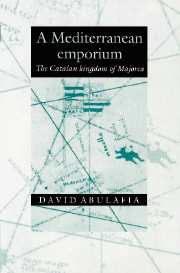Book contents
- Frontmatter
- Contents
- Preface
- Note on nomenclature
- List of the kings of Majorca, 1229–1343
- Note on the coinage of the kingdom of Majorca
- Map 1 The kingdom of Majorca
- Map 2 The western Mediterranean
- PART I UNITY AND DIVERSITY
- 1 The Balearic setting
- 2 The kingdom and its historians
- 3 The constitutional problem
- 4 One kingdom, three religions: the Muslims
- 5 One kingdom, three religions: the Jews
- PART II THE CROSSROADS OF THE MEDITERRANEAN
- Conclusion
- Appendices
- Bibliography
- Index
3 - The constitutional problem
Published online by Cambridge University Press: 05 October 2010
- Frontmatter
- Contents
- Preface
- Note on nomenclature
- List of the kings of Majorca, 1229–1343
- Note on the coinage of the kingdom of Majorca
- Map 1 The kingdom of Majorca
- Map 2 The western Mediterranean
- PART I UNITY AND DIVERSITY
- 1 The Balearic setting
- 2 The kingdom and its historians
- 3 The constitutional problem
- 4 One kingdom, three religions: the Muslims
- 5 One kingdom, three religions: the Jews
- PART II THE CROSSROADS OF THE MEDITERRANEAN
- Conclusion
- Appendices
- Bibliography
- Index
Summary
The Catalan kingdom of Majorca had a ‘split personality’. Not merely did its lands lie both in the Balearics and in scattered parts of modern France, but its reputation is variously that of a feeble state ruled by meddlesome kings and of a major commercial centre whose three main cities, Ciutat de Mallorca, Perpignan and Montpellier, were focal points of trans-Mediterranean and trans-continental trade. This chapter aims to examine the paradox of apparent political weakness set alongside formidable economic strength. Emphasis is placed on the definition of its political identity, and especially on the reasons for its creation in the will of James I of Aragon. Was it merely a shapeless málange of territories from the Auvergne to Ibiza or was it a carefully devised frontier state, poised between France, Aragon and the infidel foe? In later chapters attempts by the Majorcan monarchs at the economic integration of these territories will be examined, and trade between the constituent parts of the kingdom will come under special scrutiny; in addition, the main trade routes beyond the kingdom are analysed in order to see how far the three principal trading cities pursued complementary, competing or disinterested commercial objectives. Throughout, attention is paid to arguments for and against the concept of a Catalan–Aragonese ‘Empire’ embracing Majorca, Valencia, Sicily, Sardinia and elsewhere, whether this ‘Empire’ is understood to have existed in a political, cultural or economic sense.
- Type
- Chapter
- Information
- A Mediterranean EmporiumThe Catalan Kingdom of Majorca, pp. 34 - 55Publisher: Cambridge University PressPrint publication year: 1994
- 1
- Cited by



